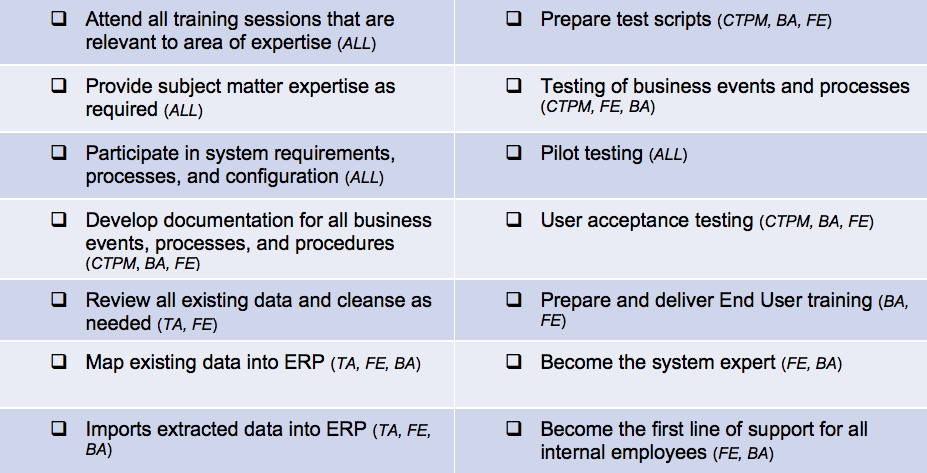ERP Readiness Series: The Core Team Is Assembled, Now What?
This series looks at ERP Readiness—what it means for your business to be ready to implement a new ERP system, upgrade, or optimize an existing one. Last time we explored the three roles every Core Team needs. In this post we list what the Core Team does, and we discuss some qualities and characteristics to look for in these team members.
Implementer (Core Team) Responsibilities
Key: CTPM = Core Team Project Manager, SPPM = Solution Provider Project Manager, FE = Functional Expert, BA = Business Analyst, TA =Technical Analyst
Core Team members should plan on allocating 50-75% of their time to the duties listed above.
It is beyond the scope of this series to address and unpack each duty individually, and many are self-explanatory. It is worth noting some features of the list, however.
First, and probably most glaring, is the note in blue stating that the Core Team will be spending 50-75% of their time on an ERP Implementation. In our experience, people see this figure and respond, “Really?! Fifty to seventy-five percent?” Our answer is an emphatic yes. Let’s talk about why this is so.
Unlike single-purpose software (a word processor or a creative suite), ERP extends into nearly every process of your business. Here at SYTE we have a saying, “ERP isn’t just software; it’s your business.” When you look at all of the areas of the business your ERP system monitors, enables, or actually runs, ERP literally is your business. From that standpoint, asking three-to-ten people to devote half of their time implementing or upgrading an ERP system is clearly vital to the success of the project.
Note that the time allocation is a range. The upper and lower extent of this range should be set by your Executive Sponsor and the company’s leadership team. How?
Like all big change initiatives, ERP projects have three levers to work with: time, scope, and cost. These levers are interrelated; changing one impacts one or both of the others. Having the Core Team allocate less of their work day to implementation will increase the amount of time needed to complete the project. While increasing the amount of time might not affect the scope of the project, it will likely increase the overall cost and may also delay the return on investment (ROI) a new ERP system should provide.
More often, business leaders want to complete an ERP project within a specific, and sometimes aggressive, timeframe. If that is the case, ensuring Core Team availability is even more important. In addition, solution providers and value-added resellers (VARs) expect the Core Team to be available and devote at least 50% of their time to the ERP project in order to bring it to successful completion.
Returning to the list of responsibilities, above, it should be noted that certain responsibilities are associated with certain roles within the Core Team. The associations listed are not prescriptive or set in stone. For example, there is no rule that says that only a Business Analyst or a Functional Expert prepares and delivers end user training—it could very well be done by the Core Team Project Manager or another member of the Core Team. The associations are meant to be informative and to demonstrate how responsibilities are usually divided on the Core Team.
Qualities and Characteristics
What qualities and characteristics should you be looking for in the people on the Core Team, within or outside of our organization? ERP projects require a lot of time and effort from a dedicated group of people, so looking at the less tangible qualities a person brings to the table becomes very important. Here are some questions to ask yourself as you consider who will serve on the Core Team:
Have they demonstrated an ability to be a team player? Asking whether or not a person can function well in a group, whether they can put the needs of the group above their own personal needs, is very relevant—especially when under stress and time constraints.
Do they go out of their way to be helpful? Is this person positive, proactive, and engaged? Are they problem solvers? Do they default to a can-do attitude? Do they try to buoy others?
Can they see the big picture and communicate it to others? This is a particularly important with the Project Managers on the Core Team. ERP projects involve countless tasks and details. Having someone who can focus on the overall goals of the project, and keep the team focused on those goals, is important.
Are they detail-oriented people? People on the Core Team need to be detail-oriented and have the ability to juggle multiple priorities in order to succeed at tasks such as system configuration, writing and testing process documentation, working through system issues, and tracking progress along the way to ensure all processes have been covered.
Are they well respected within their organization? The Core Team will work closely with one another and with the users within the organization for a long period of time. ERP implementations can take 12 to 24 months to complete. Your Core Team will be the people training your users, and some will go on to to provide longer term support. It’s important that these individuals care about building relationships within the team and the organization.
In short, you’re looking for same the qualities and characteristics on your Core Team that you’re hopefully looking for in your new hires! At SYTE, we call it the three p’s: positive, proactive, and plays well with others.
What Happens in Vegas
One final point. At SYTE, we often inaugurate a new Core Team on an ERP implementation by giving this seemingly odd warning, “What happens inside the Core Team stays within the Core Team . . . unless we provide a broader context.”
ERP projects require people and organizations to make big changes. Change can be scary and is often met with resistance. An ERP implementation can be a bumpy ride for the Core Team working to bring it to fruition. Things like system installation, configuration, and testing don’t always go as expected. Often, the people on the Core Team haven’t been through an implementation before. Needless to say, there can be frustrating moments. It’s easy to wander down the hall and air these frustrations at the water cooler with someone who isn’t on the Core Team but who will be a future user of the system. We coach our Core Teams to keep these complaints behind closed doors; working through them together and with their Executive Sponsor. Without a broader context, complaints and incomplete information won’t typically serve an organization or its people. Just as the Executive Sponsor must communicate positive support of the project from corporate leadership to the Core Team, the Core Team must communicate positive support of the project to the rest of the organization. Unfettered complaints, like rumors, have a way of growing and will make adoption of a new or upgraded ERP system much more difficult in the long term.
Do you have questions about what the Core Team does or how to approach staffing your Core Team? Would you like to run those questions by people who have done this before? If so, feel free to give us a call. We don’t sell software and would be happy to help answer your ERP questions.
————-
ERP Readiness Self-Assessment
Is your organization ready for a new or upgraded ERP solution? Find out with this complimentary self-assessment.
Doing Business Better
You strive for excellence, believe in your people, and want to do things right the first time. And you know that you need help to get to the heart of your business challenges and make the best choices for the future of your privately held manufacturing and distribution company. That’s where we come in.
We help you focus and find exactly the right path to accelerated growth and sustainable success — from your people to your processes to your ERP software.



